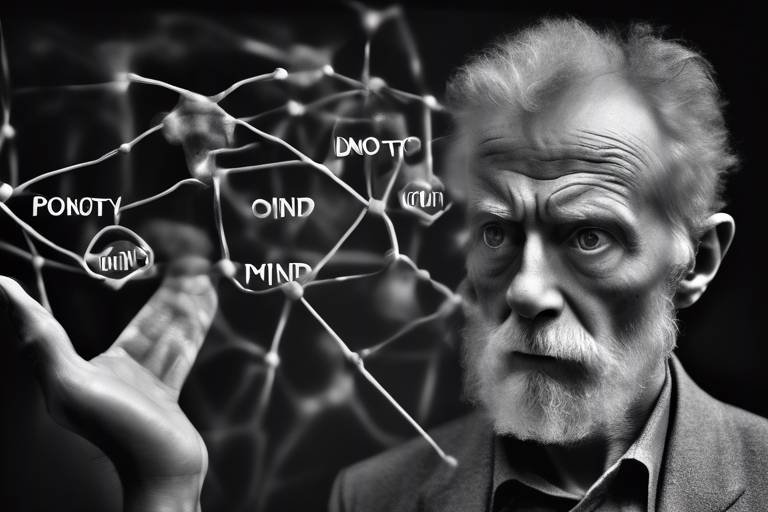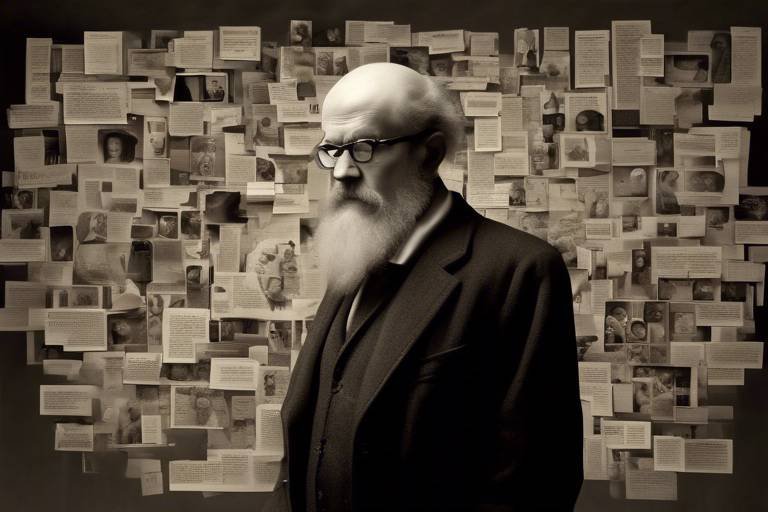Does Ontology Define Our Existence?
Have you ever wondered what it really means to exist? The question of existence has fascinated thinkers for centuries, and at the heart of this inquiry lies a field of philosophy known as ontology. This branch of philosophy dives deep into the nature of being, exploring not just what exists, but the very essence of existence itself. Imagine ontology as a lens through which we can examine the world around us—like putting on a pair of glasses that help us see the underlying structures of reality. In this article, we will embark on a journey through the intricate landscape of ontology, examining its historical roots, contemporary debates, and practical applications. By the end, you might just find yourself rethinking your own understanding of existence!
Ontology is more than just a fancy term thrown around in philosophical circles; it’s a critical framework for understanding our reality. At its core, ontology asks the fundamental questions: What exists? and What does it mean for something to exist? Think of it as the foundation of a house—without a solid foundation, the structure above it crumbles. In this section, we will clarify some essential concepts within ontology, including being, existence, and reality. Understanding these concepts is vital because they shape not only our philosophical inquiries but also our everyday experiences and interactions with the world.
Ontology hasn’t always been a standalone field; its evolution has been shaped by numerous philosophers throughout history. From ancient Greece to modern times, thinkers have grappled with the nature of existence, each contributing unique insights to the discussion. In this section, we will take a closer look at the historical context of ontological thought, highlighting some key figures who have left their mark on this fascinating field.
One cannot discuss ontology without mentioning Aristotle, whose work laid the groundwork for future philosophical thought. Aristotle introduced concepts such as substance and essence, which continue to resonate in modern philosophical discourse. His ideas prompted subsequent thinkers to explore the relationship between what something is (its essence) and what it is made of (its substance). This distinction is crucial for understanding not just existence, but also identity. For instance, when we think about a tree, its essence might be its "treeness"—the qualities that make it a tree—while its substance could refer to the physical matter that composes it.
Delving deeper into the distinction between substance and essence, we realize that these concepts shape our understanding of existence in profound ways. Substance refers to the tangible aspects of an object, while essence pertains to its inherent characteristics. This distinction is akin to the difference between a recipe and the dish it produces. The recipe (essence) lays out what the dish should be, while the ingredients (substance) are what you use to create it. Understanding this relationship helps us navigate our perceptions of identity and existence.
Aristotle’s categories of being provide a systematic approach to understanding different kinds of existence. He categorized entities into various classes, such as substances, qualities, and relations, allowing us to classify and interact with the world in a more structured way. This categorization is not just academic; it influences how we perceive and relate to our environment. For example, when we encounter a new object, our ability to classify it based on Aristotle's categories can help us understand its role and significance in our lives.
Fast forward to today, and the discussions around ontology have evolved into complex debates that touch on issues like realism vs. anti-realism. These debates question whether the world exists independently of our perceptions or if our understanding of existence is shaped solely by our experiences. This ongoing dialogue raises important questions about the nature of reality and how we can truly know what exists. Are we merely observers in a world that exists outside of us, or is our perception a fundamental part of existence itself?
Interestingly, ontology isn’t confined to philosophy; it spills over into the realm of science as well. The frameworks we use to understand and interpret scientific theories are deeply influenced by ontological considerations. For instance, the way we categorize phenomena in the natural world can impact the methodologies we adopt in scientific research. In this section, we will explore how ontological frameworks shape our scientific understanding.
One prominent view in the scientific community is scientific realism, which posits that scientific theories accurately describe the world. This perspective relies heavily on ontological commitments, as it assumes that the entities described by scientific theories—like electrons or black holes—exist independently of our observations. Understanding these commitments is crucial for grasping how scientific inquiry relates to our broader understanding of reality.
In the age of big data, ontology plays a pivotal role in organizing and interpreting vast amounts of information. In data science, ontological structures help enhance data analysis and knowledge representation. By establishing clear relationships between different data entities, we can derive meaningful insights and make informed decisions. It’s like having a well-organized library: without a proper classification system, finding the right book becomes a daunting task.
Finally, ontology has practical implications that extend into various fields, including artificial intelligence, information science, and ethics. These applications shape our understanding of existence in tangible ways. In the realm of AI, for example, ontological frameworks are essential for structuring knowledge and improving machine learning algorithms. This significance cannot be overstated—without a robust ontological foundation, intelligent systems would struggle to make sense of the complex world they are designed to navigate.
Within the context of AI, ontological frameworks facilitate better knowledge representation, allowing machines to understand and process information more effectively. This leads to improved outcomes in various applications, from natural language processing to autonomous systems. Imagine teaching a robot to recognize objects; a well-defined ontology can help the robot understand not just what an object is, but also its relationships to other objects in its environment.
Lastly, the ethical dimensions of ontology compel us to consider how our understanding of existence influences moral decision-making. As we navigate complex ethical dilemmas, our ontological beliefs shape our values and actions. For instance, if we view humans as fundamentally interconnected, we might prioritize collective well-being over individual interests. This intersection of ontology and ethics is a rich area for exploration, prompting us to reflect on the moral implications of our beliefs about existence.
- What is ontology? Ontology is a branch of philosophy that studies the nature of being and existence.
- How does ontology relate to science? Ontological frameworks influence scientific theories and methodologies by providing a structure for understanding various entities.
- Why is ontology important in artificial intelligence? Ontology helps in organizing knowledge, which is crucial for improving machine learning algorithms and enabling better decision-making.
- What are the ethical implications of ontology? Our understanding of existence can shape our moral values and influence decision-making in ethical dilemmas.

Understanding Ontology
Ontology, at its core, is a fascinating branch of philosophy that dives deep into the essence of being and existence. Think of it as the study of what is real and what it means to exist. It’s like peeling back the layers of an onion—each layer reveals more about the fundamental nature of reality. So, what exactly does ontology encompass? It addresses questions like: What entities exist? How do they relate to one another? And what does it mean for something to be considered 'real'?
One of the primary concepts in ontology is the distinction between substance and essence. These terms may sound a bit philosophical, but they are crucial in shaping our understanding of existence. Substance refers to what something is made of—the tangible stuff that constitutes an object. In contrast, essence pertains to the inherent qualities that define what something is. For instance, consider a tree: its substance includes the wood, leaves, and roots, while its essence encompasses its growth, life cycle, and role in the ecosystem. This distinction is vital because it helps us categorize entities in the world around us.
Moreover, ontology also examines the categories of being. Aristotle, a key figure in the development of ontological thought, proposed a systematic way to classify different kinds of existence. He introduced categories like substance, quantity, quality, relation, and more, which serve as a framework for understanding how we interact with the world. Imagine walking into a grocery store: you encounter various categories of items—fruits, vegetables, dairy, and so on. Each category helps you navigate the space and make sense of your surroundings. Similarly, ontological categories allow us to organize our understanding of existence.
In today's world, ontology is not just a philosophical concept; it has practical implications across various fields. For example, in computer science, ontological frameworks are used to structure data, enabling better analysis and interpretation. This is particularly relevant in areas like artificial intelligence, where understanding the relationships between different entities can enhance machine learning algorithms. By defining the nature of data and its interconnections, ontology helps machines make sense of complex information, much like how we, as humans, categorize and interpret the world around us.
In summary, ontology is a rich and complex field that shapes our understanding of existence. It challenges us to consider not just what exists, but why it exists and how different entities relate to one another. As we explore further into the historical context and contemporary debates surrounding ontology, we will uncover how these philosophical inquiries influence our perception of reality and our place within it.

The Historical Context of Ontology
Ontology has a rich and complex history that stretches back to ancient philosophical inquiries. The evolution of ontological thought can be traced through various eras, each contributing unique perspectives on the nature of existence. From the early musings of pre-Socratic philosophers to the systematic approaches of Aristotle, and onto contemporary debates, ontology has continually adapted to reflect the changing landscape of human understanding.
In ancient Greece, thinkers like Heraclitus and Parmenides laid the groundwork for ontological discussions. Heraclitus famously stated that "everything flows," emphasizing the constant change in existence, while Parmenides argued for the idea of being as a singular, unchanging reality. These contrasting views set the stage for later philosophical explorations, particularly in the works of Plato and Aristotle.
Plato's theory of forms introduced a dualistic framework, suggesting that the physical world is merely a shadow of a higher, more perfect realm of ideas. This notion influenced many subsequent philosophers, leading to debates about the nature of reality and the existence of universals. Aristotle, however, took a different approach, focusing on the empirical world and developing a more systematic ontology that categorized different types of being. His work established foundational concepts that still resonate in modern philosophy.
Throughout history, several key philosophers have shaped the discourse on ontology:
- Aristotle: Introduced the concepts of substance and essence, providing a framework for understanding the nature of being.
- Descartes: Emphasized the importance of doubt and certainty, famously declaring "I think, therefore I am," thus linking ontology with epistemology.
- Kant: Proposed that our understanding of existence is shaped by the structures of our mind, leading to a distinction between phenomena and noumena.
- Heidegger: Explored the concept of 'Being' itself, questioning what it means to exist and how this influences human experience.
As we moved into the modern era, ontological discussions expanded to include not just metaphysical inquiries but also implications for science, language, and technology. The 20th century saw a surge in interest in ontology, particularly with the advent of analytic philosophy and existentialism. Philosophers began to question the assumptions underlying traditional ontological frameworks, leading to debates about realism and anti-realism.
Today, ontology is a vibrant field of study that intersects with various disciplines, including science, artificial intelligence, and ethics. The historical context of ontology not only provides insight into the foundational concepts but also highlights the ongoing relevance of these discussions in understanding our existence in an increasingly complex world.

Aristotle's Influence
When we think about the foundations of Western philosophy, one name that stands out prominently is Aristotle. His influence on ontology is nothing short of monumental, laying the groundwork for how we perceive existence and reality today. Aristotle’s exploration of concepts such as substance and essence has shaped philosophical discourse for centuries. But what do these terms really mean? In simple terms, substance refers to what something is made of, while essence is about what something fundamentally is. Imagine a chair: its substance is the wood or metal it’s made from, but its essence is what makes it a chair—a piece of furniture designed for sitting.
Aristotle didn’t just stop at defining these terms; he also categorized different forms of existence. His work, particularly in the Categories, provides a systematic approach to understanding the various kinds of being. This categorization helps us navigate and classify the world around us, allowing us to make sense of complex ideas. For instance, he identified ten categories, including substance, quantity, quality, relation, and more, which serve as a framework for analyzing everything from physical objects to abstract concepts. This systematic approach is akin to a map that guides us through the intricate landscape of existence.
Furthermore, Aristotle’s emphasis on empirical observation and logical reasoning set the stage for future philosophical inquiries. He believed that understanding the world required not just abstract thinking but also careful observation and analysis. This blend of theory and practice resonates strongly in today’s scientific methodologies. In fact, many contemporary thinkers still grapple with Aristotle’s ideas, debating their relevance in modern ontology. His work invites us to question: Are we merely the sum of our parts, or is there something more profound that defines our existence?
In summary, Aristotle’s influence on ontology is profound and enduring. His concepts of substance and essence continue to resonate in philosophical discussions, shaping our understanding of existence. As we explore the depths of ontology, we find ourselves constantly revisiting Aristotle’s ideas, reflecting on their significance in our lives and the world around us. His legacy is not just a historical footnote; it’s a living dialogue that challenges us to think deeply about what it means to exist.
- What is ontology? - Ontology is a branch of philosophy that studies the nature of being, existence, and reality.
- Why is Aristotle important in ontology? - Aristotle's concepts of substance and essence laid the groundwork for future philosophical inquiries and continue to influence modern thought.
- How do substance and essence differ? - Substance refers to what something is made of, while essence defines what something fundamentally is.
- What are Aristotle's categories? - Aristotle identified ten categories of being, including substance, quantity, quality, and relation, to help classify different forms of existence.

Substance vs. Essence
When diving into the depths of ontology, one of the most intriguing distinctions we encounter is between substance and essence. At first glance, these terms might seem interchangeable, but they embody fundamentally different concepts that shape our understanding of reality. To put it simply, substance refers to what something is made of, while essence pertains to what something fundamentally is. Imagine a clay statue: the clay itself is the substance, while the form and identity of the statue represent its essence. This distinction is crucial because it influences how we perceive existence and identity.
Aristotle, the father of ontology, emphasized that every entity has both substance and essence. He argued that substance is the underlying reality that supports all attributes of a thing, while essence captures the defining characteristics that make an entity what it is. For instance, consider a dog. The substance of the dog includes its biological components—skin, bones, and organs—while its essence encompasses qualities like loyalty, companionship, and the ability to bark. This differentiation helps us navigate the complexities of existence by allowing us to categorize and understand entities in a more profound way.
Furthermore, this distinction has significant implications in various fields. In metaphysics, it shapes debates on identity and change. For example, if a dog undergoes surgery and its biological substance changes, is it still the same dog? This question probes the heart of our understanding of identity, challenging us to consider whether continuity of substance or essence holds greater importance in defining existence.
In addition, the substance vs. essence discourse extends into modern discussions in science and philosophy. For instance, in the realm of artificial intelligence, understanding the essence of human cognition versus the substance of algorithms is vital for creating machines that can mimic human thought. This raises questions about whether a machine could ever truly possess human-like essence or if it merely processes information as a function of its underlying substance.
In summary, the interplay between substance and essence is a cornerstone of ontological inquiry. By grasping this distinction, we not only deepen our philosophical understanding but also enrich our practical interactions with the world around us. It invites us to reflect on our own existence and the essence that defines who we are, compelling us to ask: Are we merely the sum of our parts, or is there something more that gives us our unique identity?

Categories of Being
When we dive into the , we're essentially peeling back the layers of existence itself. Aristotle, the grandmaster of ontology, proposed a systematic approach to categorize existence, which has profoundly shaped our understanding of reality. He identified ten fundamental categories that help us classify everything we encounter in the world. These categories are not just mere labels; they provide a framework that allows us to comprehend the complexities of existence.
Let's break down these categories to see how they relate to our everyday experiences:
| Category | Description |
|---|---|
| Substance | The essence of what something is, independent of its attributes. |
| Quantity | The measurable extent of a substance, such as how many or how much. |
| Quality | The attributes or characteristics that define a substance. |
| Relation | The way substances relate to one another, such as parent-child or teacher-student. |
| Place | The physical location of a substance. |
| Time | The temporal context in which a substance exists or occurs. |
| Position | The arrangement of a substance in relation to others. |
| State | The condition or situation of a substance at a given time. |
| Action | The activities that a substance engages in. |
| Passion | The experiences or actions that a substance undergoes. |
These categories are like a toolbox for understanding the world around us. For instance, when we say, “The dog is barking in the park,” we are utilizing multiple categories: the substance (the dog), the action (barking), the place (the park), and even the time (now). This categorization not only helps us communicate effectively but also enriches our comprehension of reality.
Moreover, the significance of these categories extends beyond mere classification. They allow us to engage in deeper philosophical inquiries about what it means to exist. By understanding how different categories interact, we can explore questions like: What is the essence of a person? How do relationships shape our identities? These inquiries can lead us to profound insights about our own existence and the world we inhabit.
In essence, Aristotle's categories of being serve as a lens through which we can examine the tapestry of existence. They remind us that our reality is not just a collection of random occurrences but a structured interplay of substances, qualities, and relations. So the next time you ponder your existence or the nature of reality, consider how these categories might provide clarity and insight into your thoughts and experiences.
- What is ontology? Ontology is a branch of philosophy that studies the nature of being, existence, and reality.
- Why are Aristotle's categories important? They provide a structured way to understand and classify different aspects of existence, influencing both philosophy and science.
- How do categories of being affect our daily lives? They help us make sense of our experiences and interactions, shaping our understanding of reality.

Contemporary Ontological Debates
In today's philosophical landscape, ontological debates are more vibrant than ever, reflecting the complexities of modern existence. The discussions often center around two primary positions: realism and anti-realism. But what do these terms really mean, and why do they matter? Realism asserts that entities exist independently of our perceptions or beliefs. In other words, the world is out there, waiting to be discovered, regardless of whether we are aware of it. On the flip side, anti-realism challenges this notion, suggesting that our understanding of existence is inherently shaped by our experiences, contexts, and conceptual frameworks.
To illustrate this, consider the classic metaphor of an iceberg. The tip of the iceberg represents our immediate perceptions and experiences, while the vast majority submerged beneath the surface symbolizes the deeper realities that may exist beyond our understanding. This analogy perfectly encapsulates the tension between realism and anti-realism. Proponents of realism argue that the submerged part is real and knowable, while anti-realists contend that our access to that submerged reality is limited and filtered through our subjective lenses.
Moreover, contemporary ontological debates delve into the implications of these positions for various fields, including science, ethics, and artificial intelligence. For instance, in science, a realist perspective might lead to the belief that scientific theories uncover truths about the universe, while an anti-realist viewpoint might suggest that these theories are merely useful tools for navigating our experiences. This divergence raises critical questions: What does it mean for something to be 'real'? How do our beliefs shape our understanding of existence? And can we ever truly know the world as it is?
Another fascinating aspect of these debates is the emergence of social ontology, which examines how social constructs influence our understanding of existence. Think about concepts like race, gender, and nationality. Are these categories real, or are they merely social constructs that shape our interactions and identities? This inquiry opens up a Pandora's box of philosophical questions about the nature of reality and our place within it.
In summary, contemporary ontological debates are not mere academic exercises; they resonate deeply with our everyday lives. They challenge us to reconsider our assumptions about reality and existence, urging us to engage with the world around us in a more thoughtful and reflective manner. As we navigate through these discussions, we must remain open to the possibility that our understanding of existence is a complex interplay of both objective realities and subjective experiences.
- What is ontology? Ontology is a branch of philosophy that studies the nature of being, existence, and reality.
- What are realism and anti-realism? Realism posits that entities exist independently of our perceptions, while anti-realism suggests that our understanding of existence is shaped by our experiences and contexts.
- Why do contemporary ontological debates matter? These debates influence various fields, including science, ethics, and artificial intelligence, and challenge our assumptions about reality and existence.
- What is social ontology? Social ontology examines how social constructs like race and gender influence our understanding of existence and identity.

Ontology in Science
When we think about science, we often picture laboratories, experiments, and data analysis. However, there’s a deeper layer at play that shapes how we interpret our findings and understand the universe: ontology. The role of ontology in science is not just a philosophical afterthought; it’s a critical framework that influences the way scientific theories are constructed and understood. By defining what exists and the relationships between entities, ontology helps scientists clarify their assumptions and methodologies.
At its core, ontology in science is about identifying the fundamental categories of being and how they interact. For example, when scientists study the natural world, they must categorize phenomena into specific groups—like animals, plants, minerals, and so on. This classification is not arbitrary; it reflects an underlying ontological commitment to what is considered real and significant in the scientific inquiry. As a result, the ontological framework can directly impact the kinds of questions scientists ask and the methods they use to explore those questions.
One of the most significant ontological debates in science is the tension between scientific realism and anti-realism. Scientific realism posits that the entities described by scientific theories—like electrons, black holes, and genes—exist independently of our observations. In contrast, anti-realism suggests that these entities are merely useful constructs that help us make sense of our experiences and observations. This debate raises profound questions about the nature of reality itself:
- Are scientific theories true representations of the world, or are they just models?
- Do unobservable entities really exist, or are they simply figments of our theoretical imagination?
These questions are not just academic; they influence how funding is allocated, how research is conducted, and even how educational curricula are designed. For instance, if scientists lean towards a realist perspective, they may prioritize research that aims to uncover the underlying mechanisms of phenomena, believing that these mechanisms exist regardless of our ability to observe them directly.
Furthermore, ontology plays a crucial role in fields like data science. Here, ontological frameworks help in organizing vast amounts of data, allowing scientists to draw meaningful conclusions from complex datasets. By establishing clear definitions and categories, data scientists can ensure that their analyses are robust and that their interpretations are grounded in a coherent understanding of what the data represents. For example, in a study examining health outcomes, ontological clarity helps differentiate between various types of diseases, treatments, and patient demographics, leading to more insightful and applicable results.
In summary, ontology is not just a philosophical curiosity; it is a vital component of scientific inquiry. By providing a structured approach to understanding existence, ontology helps scientists make sense of the complex world around them. Whether through guiding research methodologies or influencing theoretical debates, ontology shapes our grasp of reality and our pursuit of knowledge. As we continue to explore the mysteries of the universe, a strong ontological foundation will remain essential in guiding our scientific endeavors.
- What is ontology in science? Ontology in science refers to the study of what exists and the relationships between entities, influencing how scientific theories are constructed and interpreted.
- How does ontology affect scientific research? Ontology shapes the questions scientists ask, the methods they use, and how they categorize phenomena, impacting the overall direction of research.
- What is the difference between scientific realism and anti-realism? Scientific realism posits that the entities described by scientific theories exist independently, while anti-realism suggests they are merely useful constructs.

Scientific Realism
Scientific realism is a fascinating philosophical stance that posits scientific theories are not just useful tools for predicting phenomena but actually provide a true description of the world around us. This perspective raises intriguing questions about the nature of reality itself. Are we merely observing a series of events, or are we uncovering the underlying truths that govern our universe? Scientific realists argue that the success of science in explaining and predicting phenomena is a strong indicator that the entities posited by scientific theories—such as electrons, black holes, and even the laws of physics—actually exist. This belief is not just a whimsical notion; it is grounded in the historical success of scientific inquiry.
To understand scientific realism better, we must consider its ontological commitments. These commitments shape how we perceive reality and influence our interpretations of scientific findings. For instance, when scientists assert that a certain particle exists, they are making an ontological claim about the nature of reality. They are not merely suggesting that the particle is a useful concept; they are asserting its actual existence in the fabric of the universe.
However, scientific realism is not without its challenges. Critics, often aligned with anti-realism, argue that the history of science is littered with theories that were once accepted as true but are now considered false. Take, for example, the phlogiston theory of combustion or the caloric theory of heat. These theories were once widely accepted but later discarded as our understanding of chemistry and physics evolved. This historical perspective raises a critical question: if science is so prone to change, can we truly claim that it reveals the nature of reality?
In response to these criticisms, proponents of scientific realism emphasize the progressive nature of scientific inquiry. They argue that while individual theories may be discarded, science as a whole advances toward a deeper understanding of reality. This is akin to peeling an onion—each layer removed reveals more complex truths about the world. Furthermore, scientific realism advocates suggest that the best explanation for the success of science lies in its ability to uncover truths about the world rather than merely constructing useful fictions.
To further illustrate the implications of scientific realism, consider the following points:
- Existence of Unobservable Entities: Scientific realism posits that just because we cannot see certain entities (like quarks or gravitational waves) does not mean they do not exist. This challenges our perception of existence and pushes the boundaries of what we deem real.
- Impacts on Scientific Methodology: The belief in a reality that can be understood through scientific inquiry influences how scientists approach their work, often leading to rigorous testing and validation of theories.
- Interdisciplinary Connections: Scientific realism encourages collaboration across disciplines, as understanding complex systems often requires insights from various fields, such as physics, biology, and even philosophy.
In conclusion, scientific realism is a compelling viewpoint that invites us to reconsider our understanding of existence. It challenges us to reflect on the nature of reality and the role that scientific inquiry plays in revealing the truths that underpin our universe. By embracing this perspective, we not only enhance our appreciation of science but also deepen our engagement with the philosophical questions that shape our understanding of existence.
- What is scientific realism? Scientific realism is the view that scientific theories accurately describe the world and that the entities they posit exist independently of our observations.
- How does scientific realism differ from anti-realism? While scientific realism asserts that scientific theories provide true descriptions of reality, anti-realism suggests that theories are merely useful tools for predicting phenomena without necessarily revealing underlying truths.
- What are some examples of scientific realism? Examples include the belief in the existence of atoms, the theory of evolution, and the laws of physics, all of which are considered true descriptions of reality by scientific realists.

Ontology and Data Science
In the rapidly evolving field of data science, ontology plays a pivotal role in how we organize, interpret, and utilize data. At its core, ontology provides a structured framework that helps data scientists make sense of vast amounts of information. Think of ontology as a well-organized library where every book has its place, making it easy to find what you need. Without this structure, data can become chaotic and overwhelming, much like a disorganized library where you can’t find a single book.
One of the primary functions of ontology in data science is to enhance data interoperability. When different datasets are created, they often use various terminologies and structures. Ontological frameworks standardize these terms, allowing for seamless integration and interpretation. For instance, if one dataset uses "customer" and another uses "client," an ontological approach can unify these terms under a single concept, facilitating better analysis and insights.
Moreover, ontology aids in knowledge representation, which is crucial for machine learning algorithms. By defining the relationships between different entities, ontology allows algorithms to understand context and make more informed predictions. For example, in a healthcare setting, an ontology can help a machine learning model differentiate between symptoms, diagnoses, and treatments, leading to more accurate recommendations.
To illustrate the impact of ontology in data science, consider the following table that outlines key benefits:
| Benefit | Description |
|---|---|
| Enhanced Data Integration | Facilitates combining datasets from different sources by standardizing terminology. |
| Improved Data Quality | Ensures consistency and accuracy in data representation, reducing errors. |
| Better Knowledge Discovery | Enables more effective pattern recognition and insights generation. |
| Facilitated Machine Learning | Provides a structured understanding of data, improving algorithm performance. |
In addition to these benefits, ontology also supports the explainability of data-driven decisions. In an age where algorithms influence critical decisions—from loan approvals to medical diagnoses—understanding how these decisions are made is vital. An ontological approach can clarify the reasoning behind a model's predictions, making it easier for stakeholders to trust and validate the outcomes.
In conclusion, ontology is not just a theoretical concept; it is a practical tool that significantly enhances the field of data science. By providing a structured approach to understanding data, ontology enables better integration, quality, and insight generation. As the field continues to grow, the importance of ontology will only become more pronounced, making it an essential component for anyone looking to harness the power of data effectively.
- What is ontology in data science? Ontology in data science refers to a structured framework that defines the relationships and categories of data, facilitating better organization and interpretation.
- How does ontology improve data integration? By standardizing terms and definitions, ontology allows for seamless merging of datasets from different sources, reducing confusion and enhancing analysis.
- Why is explainability important in data science? Explainability is crucial because it helps stakeholders understand how data-driven decisions are made, fostering trust and accountability in machine learning models.
- Can ontology be applied outside of data science? Yes, ontology has applications in various fields, including artificial intelligence, information science, and even ethics, wherever structured understanding is needed.

Practical Applications of Ontology
Ontology is not just a theoretical concept confined to the dusty shelves of philosophy; it has practical implications that ripple through various fields, shaping our understanding of existence and improving our interactions with the world. From artificial intelligence to ethics, ontology serves as a foundational framework that helps us categorize and interpret reality in meaningful ways. The beauty of ontology lies in its versatility—it's like a Swiss Army knife for understanding and organizing knowledge. But how exactly does it function in these diverse domains? Let’s dive into some of its most significant applications.
In the realm of artificial intelligence (AI), ontological frameworks play a pivotal role in structuring knowledge. Imagine teaching a machine to understand the world as we do; it requires a well-defined set of categories and relationships. Ontology provides this structure by offering a formal representation of knowledge that machines can process. For instance, in natural language processing, ontologies help AI systems grasp the meanings of words based on their relationships to other words. This not only enhances the machine's ability to interpret human language but also improves its learning algorithms, making it more adept at tasks like image recognition and decision-making.
Moreover, in the field of data science, ontology is crucial for organizing and interpreting vast amounts of data. Think of ontology as a map for navigating the complex landscape of information. By establishing clear relationships between different data points, ontological structures enable data scientists to extract meaningful insights from seemingly chaotic datasets. For example, in healthcare, ontologies can help in standardizing medical terminologies, leading to better data interoperability and improved patient care. The result? More accurate analyses and informed decision-making, ultimately enhancing the quality of services across various sectors.
But it doesn't stop there. The ethical implications of ontology are equally profound. Our understanding of existence shapes our moral frameworks and decision-making processes. When we consider questions like, "What does it mean to exist?" or "What is the nature of personhood?" we are engaging in ontological inquiries that directly influence ethical considerations. For instance, in bioethics, the ontological status of embryos or artificial intelligences raises critical questions about rights, responsibilities, and moral obligations. By examining these ontological questions, we can better navigate the murky waters of ethical dilemmas in contemporary society.
To summarize, ontology is not merely an abstract philosophical concept; it is a practical tool that enhances our understanding and interaction with the world around us. Its applications in AI, data science, and ethics illustrate its significance in shaping our reality and guiding our moral compass. As we continue to explore and expand our ontological frameworks, we unlock new possibilities for innovation, understanding, and ethical reasoning.
- What is ontology? Ontology is a branch of philosophy that studies the nature of being and existence, focusing on categories and relationships of entities.
- How does ontology apply to artificial intelligence? Ontology helps structure knowledge, enabling AI systems to understand and process information more effectively.
- Why is ontology important in data science? It provides a framework for organizing and interpreting data, facilitating better analyses and insights.
- What role does ontology play in ethics? Ontological inquiries help shape moral frameworks and influence how we approach ethical dilemmas.

Ontology in Artificial Intelligence
In the rapidly evolving world of artificial intelligence (AI), the concept of ontology plays a pivotal role in shaping how machines understand and interact with the world. At its core, ontology in AI involves the formal representation of knowledge within a specific domain, providing a structured framework that enables machines to process information intelligently. Imagine trying to navigate a complex city without a map; similarly, AI systems require ontological structures to make sense of vast amounts of data and to discern meaningful patterns.
One of the primary functions of ontology in AI is to facilitate knowledge representation. By organizing information into categories and relationships, ontologies allow AI systems to comprehend the context of data. For instance, consider an AI designed to assist in medical diagnosis. It needs to understand not only the symptoms presented but also how those symptoms relate to various diseases, treatments, and patient histories. Through the use of ontologies, the AI can effectively create a web of knowledge that enhances its diagnostic capabilities.
Moreover, ontological frameworks significantly improve machine learning algorithms. These frameworks provide a common vocabulary and set of concepts that enable different systems to communicate and share knowledge effectively. For example, in a smart home environment, various devices such as thermostats, lights, and security systems can use a shared ontology to understand each other's functions and coordinate actions. This interoperability is crucial for creating cohesive and intelligent systems that respond to user needs seamlessly.
To illustrate the impact of ontology in AI, consider the following table that outlines some key aspects:
| Aspect | Description | Example |
|---|---|---|
| Knowledge Representation | Organizes information into structured formats for machine understanding. | Medical ontologies that relate symptoms to diseases. |
| Interoperability | Facilitates communication between different AI systems. | Smart home devices coordinating actions based on shared ontologies. |
| Enhanced Learning | Improves the efficiency of machine learning algorithms. | AI systems that adapt based on structured knowledge inputs. |
As we delve deeper into the implications of ontology in AI, it's essential to consider the ethical dimensions that arise. How do we ensure that the ontologies we create reflect diverse perspectives and do not perpetuate biases? This question is crucial as AI systems become increasingly integrated into our daily lives, influencing decisions in areas like hiring, law enforcement, and healthcare. The challenge lies in developing ontological frameworks that are not only robust and comprehensive but also equitable and just.
In conclusion, ontology is not just a theoretical concept confined to philosophical debates; it is a practical tool that significantly enhances the capabilities of artificial intelligence. By providing a structured approach to knowledge representation and facilitating communication between systems, ontology empowers AI to function more intelligently and effectively. As we continue to innovate in this field, the importance of thoughtful ontological design will only grow, shaping the future of AI and its role in society.
- What is ontology in AI? Ontology in AI refers to the formal representation of knowledge within a specific domain, allowing machines to understand and process information effectively.
- How does ontology improve machine learning? Ontology enhances machine learning by providing structured knowledge inputs that improve learning efficiency and accuracy.
- What are the ethical implications of ontology in AI? The ethical implications include ensuring that ontologies are diverse and do not perpetuate biases, especially in decision-making systems.

Ethical Implications of Ontology
When we dive into the , we're not just scratching the surface of philosophical inquiry; we're exploring how our understanding of existence shapes our moral landscape. Think about it: our beliefs about what entities exist, their nature, and their relationships can profoundly influence how we interact with the world and each other. This intersection of ontology and ethics raises some fascinating questions: What does it mean to exist? Who or what deserves moral consideration? And how do our ontological commitments impact our ethical frameworks?
For instance, in the realm of environmental ethics, ontology plays a crucial role in shaping our views on nature and non-human entities. If we adopt an anthropocentric perspective—believing that only humans have intrinsic value—then our ethical obligations towards animals and the environment may be significantly diminished. Conversely, an ecocentric view that recognizes the intrinsic value of all living beings can lead to a more robust ethical commitment to environmental protection and sustainability. This illustrates how our ontological assumptions can either limit or expand our moral horizons.
Moreover, the rise of artificial intelligence and advanced technologies brings new ethical dilemmas that are deeply rooted in ontological questions. As we create machines that mimic human behavior, we are forced to confront the nature of consciousness, agency, and personhood. Do these entities deserve rights? Should we consider their existence in our ethical calculations? The answers to these questions are not straightforward and require a careful ontological analysis to determine what it means to "exist" in a moral sense.
In the realm of social justice, ontology also plays a pivotal role. Our understanding of existence influences how we view marginalized groups and their rights. For example, if we adopt a narrow view of personhood that excludes certain identities, we risk perpetuating systems of oppression. On the other hand, a broader, more inclusive ontological perspective can foster empathy and understanding, leading to more equitable treatment of all individuals.
To summarize, the ethical implications of ontology are vast and complex, touching on various aspects of our lives. Here’s a brief overview of some key points:
- Environmental Ethics: Our ontological views shape our responsibilities towards nature.
- Artificial Intelligence: Questions of rights and personhood arise from our understanding of existence.
- Social Justice: An inclusive ontology can foster empathy and equality.
As we navigate these intricate relationships between ontology and ethics, it becomes clear that our philosophical inquiries are not just abstract musings; they have real-world consequences. By critically examining our ontological beliefs, we can better understand and address the ethical challenges we face in an increasingly complex world.
- What is ontology? Ontology is a branch of philosophy that studies the nature of being, existence, and reality.
- How does ontology relate to ethics? Ontology influences our understanding of existence, which in turn shapes our moral beliefs and ethical frameworks.
- Why is the ontology of artificial intelligence important? Understanding the ontological status of AI can help us determine its rights and ethical considerations.
- Can ontology affect environmental ethics? Yes, our beliefs about the value of nature and non-human entities can impact our ethical obligations towards them.
Frequently Asked Questions
- What is ontology?
Ontology is a branch of philosophy that studies the nature of being, existence, and reality. It delves into questions about what entities exist and how they can be categorized and related to one another. Think of it as a map of existence, helping us navigate through the complexities of what it means to be.
- How does ontology differ from other philosophical branches?
While other branches of philosophy, like epistemology, focus on knowledge and belief, ontology is specifically concerned with the nature of existence itself. It's like comparing a chef who specializes in cooking to one who focuses on the science of flavors; they both deal with food but from different angles.
- Why is ontology important in understanding reality?
Ontology shapes our perception of reality by providing a framework for categorizing and interpreting the world around us. It influences how we think about everything from the simplest objects to complex concepts, helping us make sense of our experiences and the universe.
- Can ontology be applied in science?
Absolutely! Ontological frameworks are essential in science as they help structure scientific theories and methodologies. For example, scientific realism relies on ontological commitments to assert that theories accurately describe the world, bridging the gap between abstract concepts and observable phenomena.
- What role does ontology play in artificial intelligence?
In AI, ontology is crucial for organizing knowledge and improving machine learning algorithms. It helps systems understand and process information more effectively, much like a librarian categorizing books to make them easier to find and understand.
- How does ontology relate to ethics?
Ontology intersects with ethics by influencing how we perceive existence and identity, which in turn affects our moral decision-making. Understanding different ontological perspectives can help us navigate complex ethical dilemmas, highlighting the importance of our beliefs about existence in shaping our values.
- What are some contemporary debates in ontology?
Current debates often revolve around issues like realism versus anti-realism. These discussions explore whether entities exist independently of our perceptions or whether they are constructed by our experiences. It's a bit like debating whether a tree falling in a forest makes a sound if no one is around to hear it!



















